The Cambridge History of China. Vol. 12: Republican China, 1912-1949, Part 1
Подождите немного. Документ загружается.

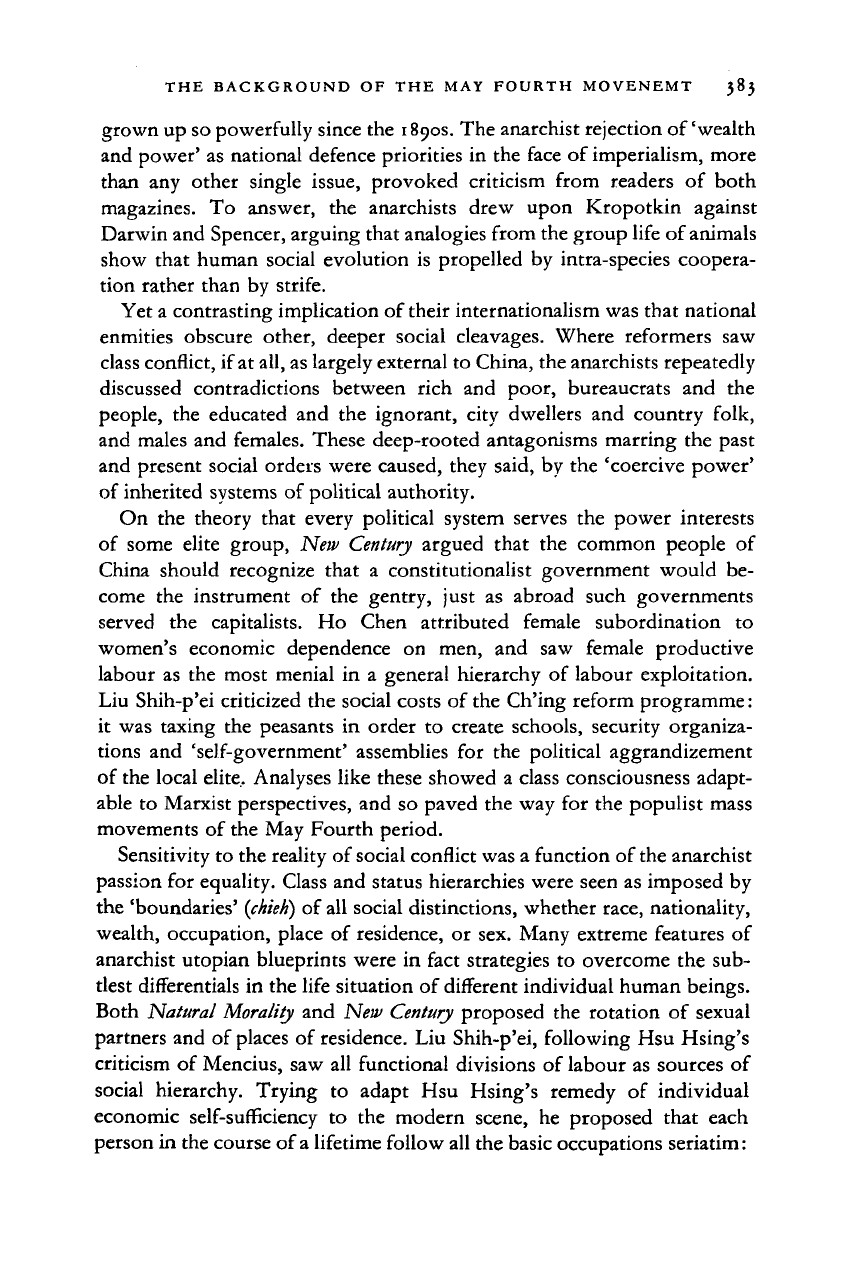
THE BACKGROUND OF THE MAY FOURTH MOVENEMT 383
grown up so powerfully since the 1890s. The anarchist rejection of 'wealth
and power' as national defence priorities in the face of imperialism, more
than any other single issue, provoked criticism from readers of both
magazines. To answer, the anarchists drew upon Kropotkin against
Darwin and Spencer, arguing that analogies from the group life of animals
show that human social evolution is propelled by intra-species coopera-
tion rather than by strife.
Yet a contrasting implication of their internationalism was that national
enmities obscure other, deeper social cleavages. Where reformers saw
class conflict, if at all, as largely external to China, the anarchists repeatedly
discussed contradictions between rich and poor, bureaucrats and the
people, the educated and the ignorant, city dwellers and country folk,
and males and females. These deep-rooted antagonisms marring the past
and present social orders were caused, they said, by the 'coercive power'
of inherited systems of political authority.
On the theory that every political system serves the power interests
of some elite group, New
Century
argued that the common people of
China should recognize that a constitutionalist government would be-
come the instrument of the gentry, just as abroad such governments
served the capitalists. Ho Chen attributed female subordination to
women's economic dependence on men, and saw female productive
labour as the most menial in a general hierarchy of labour exploitation.
Liu Shih-p'ei criticized the social costs of the Ch'ing reform programme:
it was taxing the peasants in order to create schools, security organiza-
tions and 'self-government' assemblies for the political aggrandizement
of the local elite. Analyses like these showed a class consciousness adapt-
able to Marxist perspectives, and so paved the way for the populist mass
movements of the May Fourth period.
Sensitivity to the reality of social conflict was a function of the anarchist
passion for equality. Class and status hierarchies were seen as imposed by
the 'boundaries'
(chieti)
of all social distinctions, whether race, nationality,
wealth, occupation, place of residence, or sex. Many extreme features of
anarchist Utopian blueprints were in fact strategies to overcome the sub-
tlest differentials in the life situation of different individual human beings.
Both Natural
Morality
and New
Century
proposed the rotation of sexual
partners and of places of residence. Liu Shih-p'ei, following Hsu Hsing's
criticism of Mencius, saw all functional divisions of labour as sources of
social hierarchy. Trying to adapt Hsu Hsing's remedy of individual
economic self-sufficiency to the modern scene, he proposed that each
person in the course of
a
lifetime follow all the basic occupations seriatim:
Cambridge Histories Online © Cambridge University Press, 2008
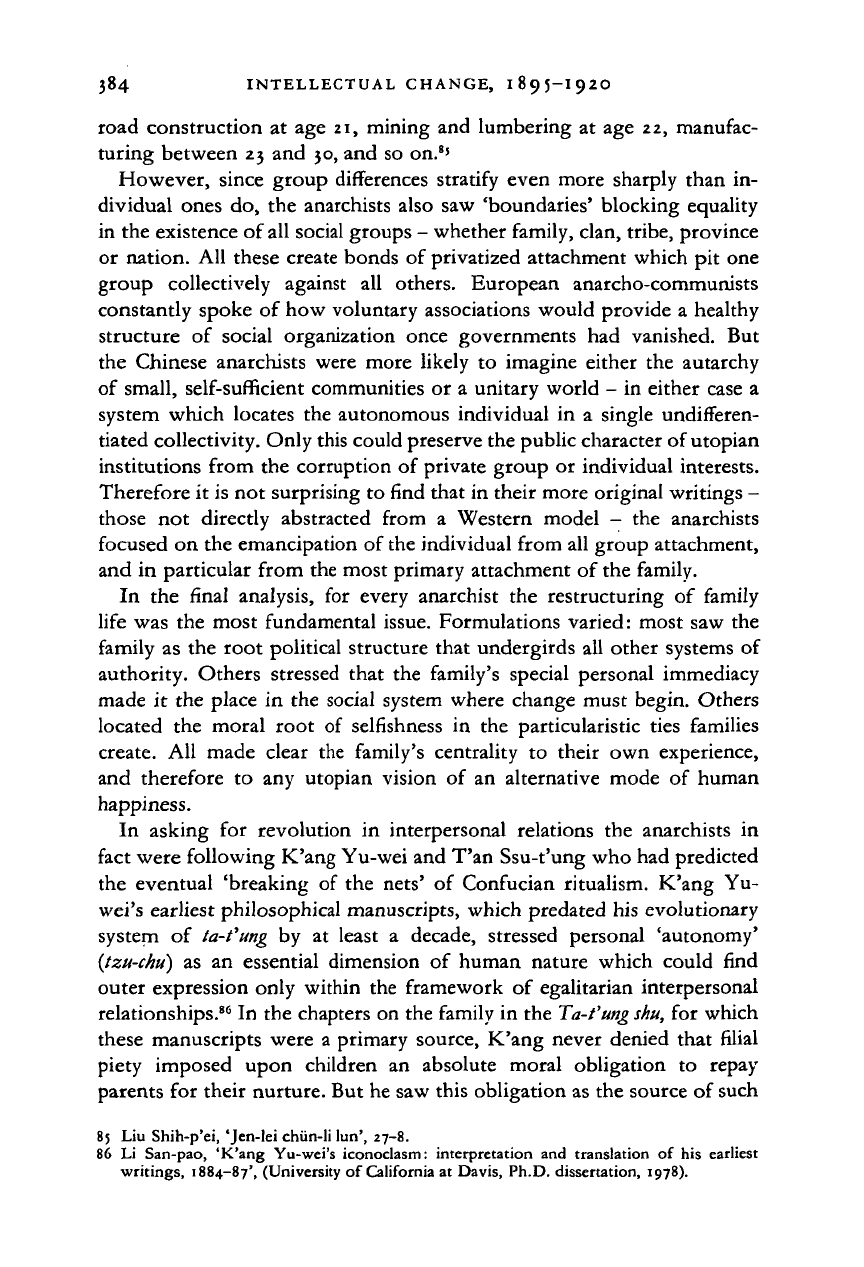
384 INTELLECTUAL CHANGE, 1895-I92O
road construction at age 21, mining and lumbering at age 22, manufac-
turing between 23 and 30, and so on.
8
'
However, since group differences stratify even more sharply than in-
dividual ones do, the anarchists also saw 'boundaries' blocking equality
in the existence of all social groups - whether family, clan, tribe, province
or nation. All these create bonds of privatized attachment which pit one
group collectively against all others. European anarcho-communists
constantly spoke of how voluntary associations would provide a healthy
structure of social organization once governments had vanished. But
the Chinese anarchists were more likely to imagine either the autarchy
of small, self-sufficient communities or a unitary world - in either case a
system which locates the autonomous individual in a single undifferen-
tiated collectivity. Only this could preserve the public character of Utopian
institutions from the corruption of private group or individual interests.
Therefore it is not surprising to find that in their more original writings -
those not directly abstracted from a Western model
—
the anarchists
focused on the emancipation of the individual from all group attachment,
and in particular from the most primary attachment of the family.
In the final analysis, for every anarchist the restructuring of family
life was the most fundamental issue. Formulations varied: most saw the
family as the root political structure that undergirds all other systems of
authority. Others stressed that the family's special personal immediacy
made it the place in the social system where change must begin. Others
located the moral root of selfishness in the particularistic ties families
create. All made clear the family's centrality to their own experience,
and therefore to any Utopian vision of an alternative mode of human
happiness.
In asking for revolution in interpersonal relations the anarchists in
fact were following K'ang Yu-wei and T'an Ssu-t'ung who had predicted
the eventual 'breaking of the nets' of Confucian ritualism. K'ang Yu-
wei's earliest philosophical manuscripts, which predated his evolutionary
system of ta-t'tmg by at least a decade, stressed personal 'autonomy'
{tzu-chu) as an essential dimension of human nature which could find
outer expression only within the framework of egalitarian interpersonal
relationships.
86
In the chapters on the family in the
Ta-t'ung
shu,
for which
these manuscripts were a primary source, K'ang never denied that filial
piety imposed upon children an absolute moral obligation to repay
parents for their nurture. But he saw this obligation as the source of such
85
Liu
Shih-p'ei, 'Jen-lei chiin-li
lun', 27-8.
86
Li
San-pao, 'K'ang Yu-wei's iconoclasm: interpretation
and
translation
of his
earliest
writings, 1884-87', (University
of
California
at
Davis,
Ph.D.
dissertation, 1978).
Cambridge Histories Online © Cambridge University Press, 2008
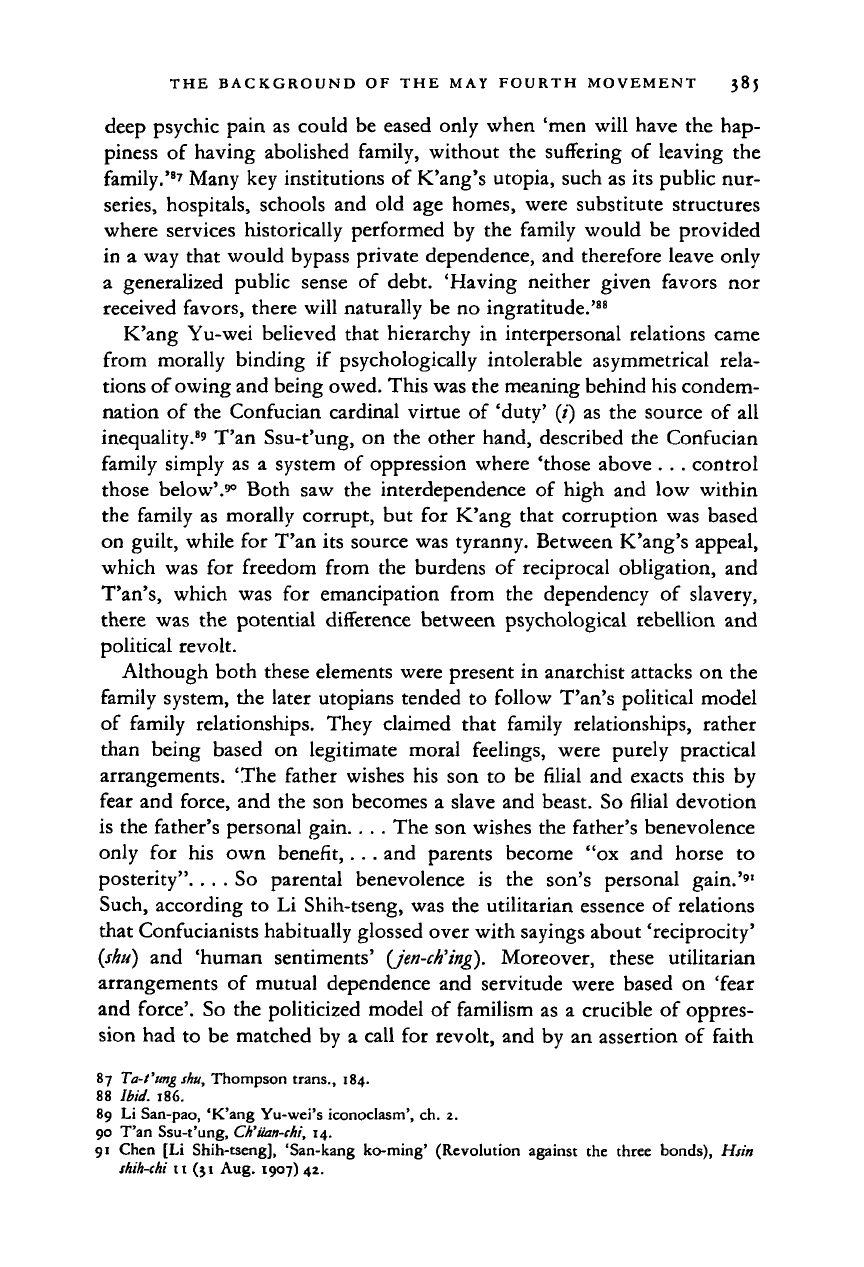
THE BACKGROUND OF THE MAY FOURTH MOVEMENT 385
deep psychic pain as could be eased only when 'men will have the hap-
piness of having abolished family, without the suffering of leaving the
family.'*
7
Many key institutions of K'ang's Utopia, such as its public nur-
series,
hospitals, schools and old age homes, were substitute structures
where services historically performed by the family would be provided
in a way that would bypass private dependence, and therefore leave only
a generalized public sense of debt. 'Having neither given favors nor
received favors, there will naturally be no ingratitude.'
88
K'ang Yu-wei believed that hierarchy in interpersonal relations came
from morally binding if psychologically intolerable asymmetrical rela-
tions of owing and being owed. This was the meaning behind his condem-
nation of the Confucian cardinal virtue of 'duty' (/) as the source of all
inequality.
8
' T'an Ssu-t'ung, on the other hand, described the Confucian
family simply as a system of oppression where 'those above . . . control
those below'.
90
Both saw the interdependence of high and low within
the family as morally corrupt, but for K'ang that corruption was based
on guilt, while for T'an its source was tyranny. Between K'ang's appeal,
which was for freedom from the burdens of reciprocal obligation, and
T'an's, which was for emancipation from the dependency of slavery,
there was the potential difference between psychological rebellion and
political revolt.
Although both these elements were present in anarchist attacks on the
family system, the later Utopians tended to follow T'an's political model
of family relationships. They claimed that family relationships, rather
than being based on legitimate moral feelings, were purely practical
arrangements. 'The father wishes his son to be filial and exacts this by
fear and force, and the son becomes a slave and beast. So filial devotion
is the father's personal gain. . . . The son wishes the father's benevolence
only for his own benefit, . . . and parents become "ox and horse to
posterity". ... So parental benevolence is the son's personal gain.'
91
Such, according to Li Shih-tseng, was the utilitarian essence of relations
that Confucianists habitually glossed over with sayings about 'reciprocity'
(shu) and 'human sentiments'
(Jen-ch'ing).
Moreover, these utilitarian
arrangements of mutual dependence and servitude were based on 'fear
and force'. So the politicized model of familism as a crucible of oppres-
sion had to be matched by a call for revolt, and by an assertion of faith
87 Ta-t'mgshu, Thompson trans., 184.
88
Ibid.
186.
89 Li San-pao, 'K'ang Yu-wei's iconoclasm', ch. 2.
90 T'an Ssu-t'ung,
Ch'iian-chi,
14.
91 Chen [Li Shih-tseng], 'San-kang ko-ming' (Revolution against the three bonds), Hrin
shih-chi
11 (31 Aug. 1907) 42.
Cambridge Histories Online © Cambridge University Press, 2008
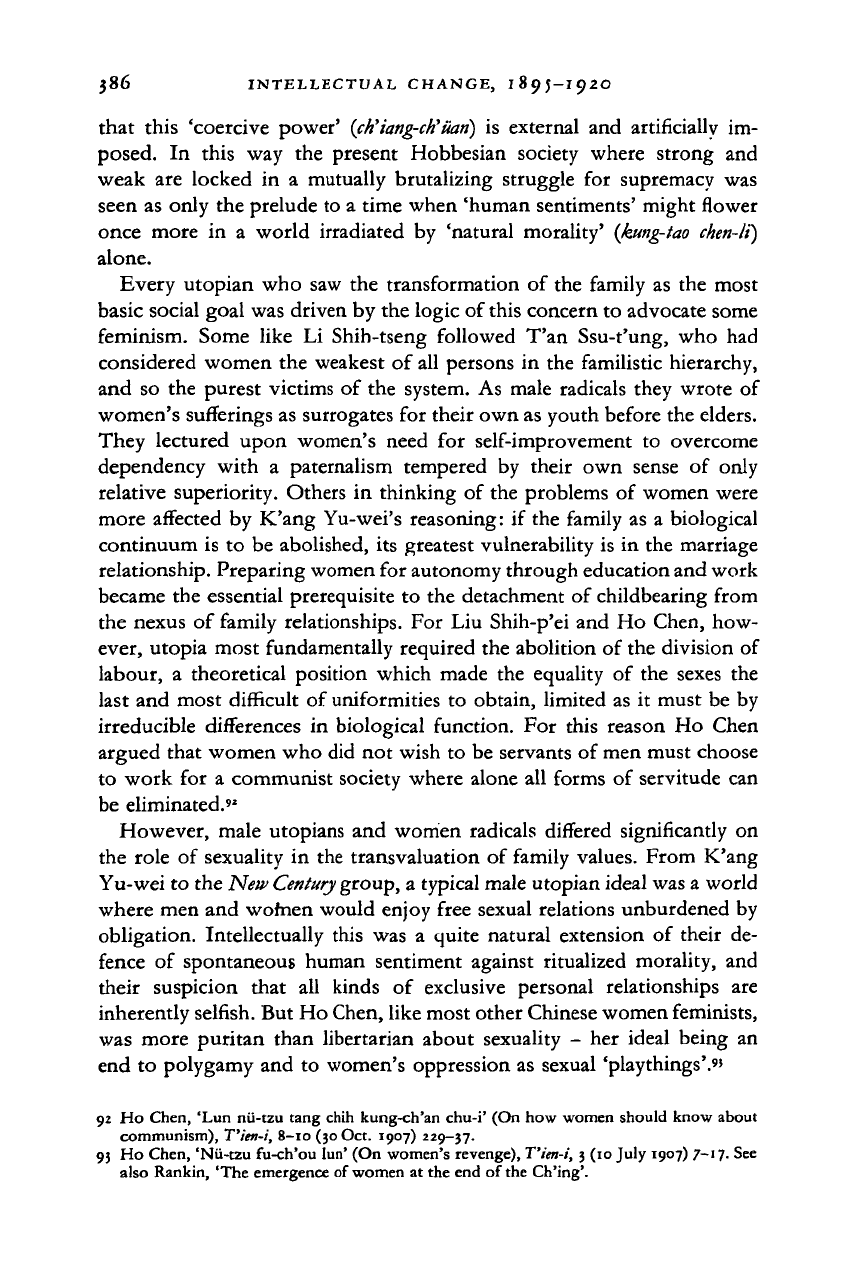
386 INTELLECTUAL CHANGE, 1895-192O
that this 'coercive power'
(ch'iang-ch'iiari)
is
external and artificially im-
posed.
In
this
way the
present Hobbesian society where strong
and
weak are locked
in a
mutually brutalizing struggle
for
supremacy was
seen as only the prelude to
a
time when 'human sentiments' might flower
once more
in a
world irradiated
by
'natural morality'
(kung-tao chen-li)
alone.
Every Utopian who saw the transformation
of
the family as the most
basic social goal was driven by the logic of this concern to advocate some
feminism. Some like
Li
Shih-tseng followed T'an Ssu-t'ung, who had
considered women the weakest
of
all persons
in
the familistic hierarchy,
and
so
the purest victims
of
the system. As male radicals they wrote of
women's sufferings as surrogates for their own as youth before the elders.
They lectured upon women's need
for
self-improvement
to
overcome
dependency with
a
paternalism tempered
by
their own sense
of
only
relative superiority. Others
in
thinking
of
the problems
of
women were
more affected by K'ang Yu-wei's reasoning:
if
the family as
a
biological
continuum is
to
be abolished, its greatest vulnerability is in the marriage
relationship. Preparing women for autonomy through education and work
became the essential prerequisite to the detachment of childbearing from
the nexus
of
family relationships. For Liu Shih-p'ei and Ho Chen, how-
ever, Utopia most fundamentally required the abolition of the division of
labour,
a
theoretical position which made the equality
of
the sexes
the
last and most difficult of uniformities
to
obtain, limited as
it
must be by
irreducible differences
in
biological function. For this reason Ho Chen
argued that women who did not wish to be servants of men must choose
to work
for a
communist society where alone all forms
of
servitude can
be eliminated."
However, male Utopians and women radicals differed significantly
on
the role
of
sexuality
in
the transvaluation
of
family values. From K'ang
Yu-wei to the New
Century
group, a typical male Utopian ideal was a world
where men and women would enjoy free sexual relations unburdened by
obligation. Intellectually this was
a
quite natural extension
of
their de-
fence
of
spontaneous human sentiment against ritualized morality, and
their suspicion that
all
kinds
of
exclusive personal relationships
are
inherently selfish. But Ho Chen, like most other Chinese women feminists,
was more puritan than libertarian about sexuality
-
her ideal being
an
end to polygamy and
to
women's oppression as sexual 'playthings'."
92
Ho
Chen, 'Lun nii-t2u tang chih kung-ch'an chu-i' (On how women should know about
communism),
T'ien-i,
8-10 (jo Oct. 1907) 229-37.
93 Ho Chen, 'Nii-tzu fu-ch'ou lun' (On women's revenge),
T'ien-i,
3 (10 July 1907) 7-17. See
also Rankin, "The emergence of women at the end of the Ch'ing'.
Cambridge Histories Online © Cambridge University Press, 2008

THE BACKGROUND OF THE MAY FOURTH MOVEMENT 387
Anarchist rhetoric
was
at its
most militant when
the
social institutions
of marriage
and the
family were being analysed
as
political systems,
based
on raw
power. However, this political model
of
family relations
was
difficult
to
sustain when anarchists dwelt
at any
length upon
the
subjec-
tive feelings
of
individuals
as
family members.
In
Chinese funeral cere-
monies pious Confucian children ritually blame themselves
for
their
parent's death.
'How can the
children
be
to
blame ?' cried
Li
Shih-tseng,
94
intending
to
lay
blame
for
false social attitudes
on a
corrupt environment.
But
in the
family slaves
are
also dependants;
and the
parents' external
power
is
matched
by the
child's docile acceptance
of
weakness
and
need.
Belief in false Confucian values,
the
'superstition' that chains
an
individual
to accept dependency became, then,
an
internal failure
of the
self,
to be
overcome
by
moral effort.
In
this
way the
anarchists' desire
to
revolu-
tionize
the
Confucian family system
led
them
to
reaffirm
the
earlier reform
belief
in the
human being's responsibility
as a
moral agent
in the fur-
therance
of
progress.
Yet within this
new
individualist framework,
the
question
of the
nature
of
moral success posed ambiguities earlier reformers
had not
faced. 'Without autonomy
{tu-li),
one
naturally loses
the
power
of
liberty
{tzu-yu);
without liberty
one
naturally loses
the
power
of
equality (p'ing-
tettg),'"
said
Liu
Shih-p'ei.
The
Western neologism 'liberty', used here
to refer
to
formal civil rights
in a
political community,
is
merely
a
link
in
the
natural process which begins with
the
individual's inner
self-
definition (autonomy)
and
ends with
his
or
her
ideal experience
of
human
relationships (equality).
Yet in
this sense
the
enemies
of
autonomy
and
equality
are not the
impersonal structures
of the
state, which threaten
liberty,
but
those other individuals
who
in
actual life
are
the
usual source
of
the
most intimate human ties.
In
opposing autonomy
and
equality
to
kinship,
the
anarchists suggested
not a
political ideal
of
the
free citizen,
but
a
moral ideal
of
the
self-sufficient person.
Its
realization carried
new
psychic costs: rejection
of
the
network
of
relationships which were both
conventionally venerated
and a
primary source
of
security
and
gratifica-
tion.
The
struggle
for
autonomy became
not a
straightforward search
for
personal liberation,
but an
arduous self-discipline where there was
a
heavy
burden
of
responsibility
for
self and
all too
easily also
a
burden
of
guilt.
The demand
for
individual liberation from
the
constraints
of Con-
fucian ritualism
was at the
heart
of
what
may be
called
the
existential
liberalism
of the
reform generation.
The
attack
on the
family swelled
this movement, but
it
also showed
the
psychic costs of individualism when
94
Li
Shih-tseng, 'San-kang koming',
41-2.
95
Liu
Shih-p'ei, 'Jen-lei chiin-li
lun',
25.
Cambridge Histories Online © Cambridge University Press, 2008
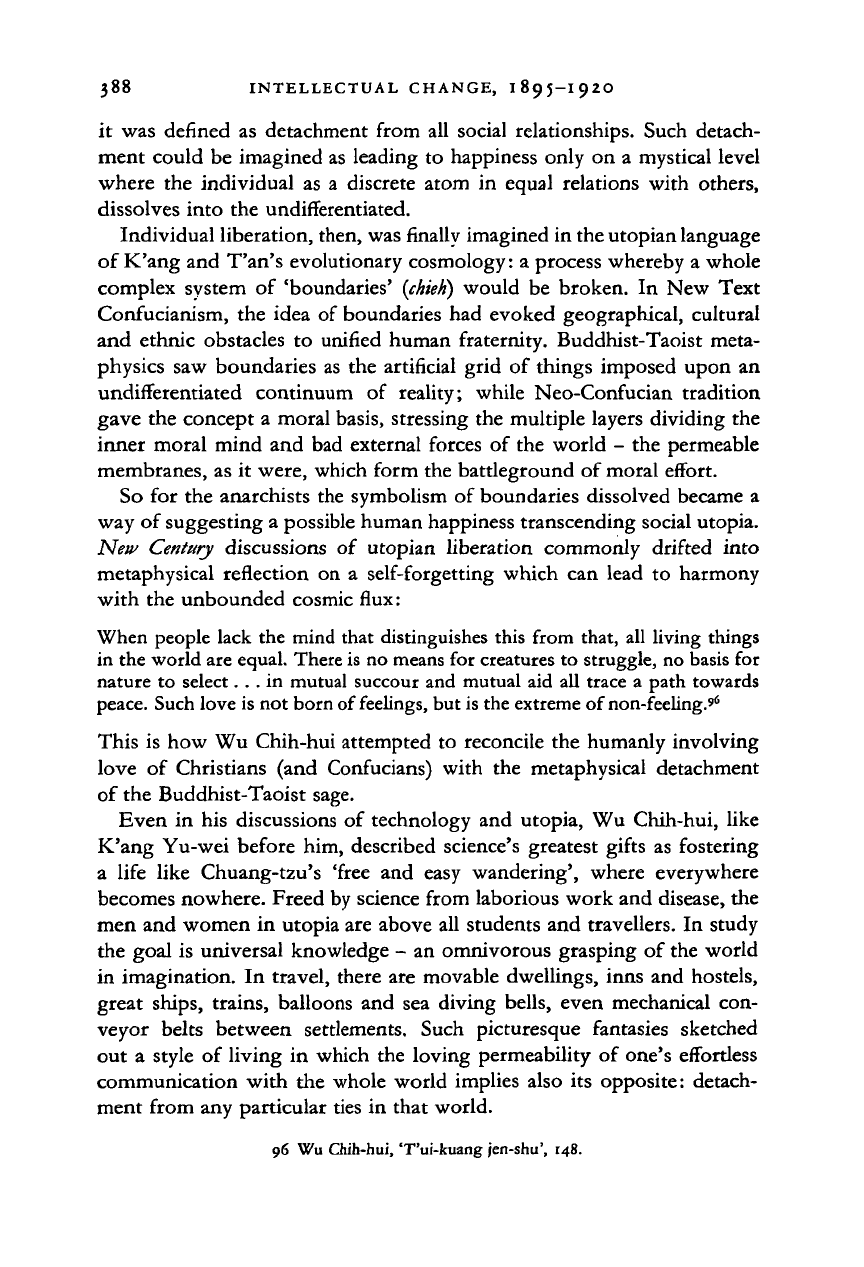
388 INTELLECTUAL CHANGE, 1895-192O
it was defined
as
detachment from all social relationships. Such detach-
ment could be imagined as leading to happiness only on
a
mystical level
where the individual as
a
discrete atom
in
equal relations with others,
dissolves into the undifferentiated.
Individual liberation, then, was finally imagined in the Utopian language
of K'ang and T'an's evolutionary cosmology: a process whereby
a
whole
complex system
of
'boundaries'
(chieh)
would
be
broken.
In
New Text
Confucianism, the idea of boundaries had evoked geographical, cultural
and ethnic obstacles
to
unified human fraternity. Buddhist-Taoist meta-
physics saw boundaries as the artificial grid
of
things imposed upon
an
undifferentiated continuum
of
reality; while Neo-Confucian tradition
gave the concept
a
moral basis, stressing the multiple layers dividing the
inner moral mind and bad external forces
of
the world
-
the permeable
membranes, as
it
were, which form the battleground of moral effort.
So for the anarchists the symbolism of boundaries dissolved became
a
way of suggesting a possible human happiness transcending social Utopia.
New Century discussions
of
Utopian liberation commonly drifted into
metaphysical reflection on
a
self-forgetting which can lead
to
harmony
with the unbounded cosmic flux:
When people lack the mind that distinguishes this from that, all living things
in the world are equal. There is no means for creatures to struggle, no basis for
nature to select... in mutual succour and mutual aid all trace
a
path towards
peace. Such love is not born of
feelings,
but is the extreme of non-feeling.
96
This
is
how Wu Chih-hui attempted
to
reconcile the humanly involving
love
of
Christians (and Confucians) with
the
metaphysical detachment
of the Buddhist-Taoist sage.
Even
in
his discussions
of
technology and Utopia, Wu Chih-hui, like
K'ang Yu-wei before him, described science's greatest gifts
as
fostering
a life like Chuang-tzu's 'free
and
easy wandering', where everywhere
becomes nowhere. Freed by science from laborious work and disease, the
men and women
in
Utopia are above all students and travellers.
In
study
the goal is universal knowledge
-
an omnivorous grasping
of
the world
in imagination.
In
travel, there are movable dwellings, inns and hostels,
great ships, trains, balloons and sea diving bells, even mechanical con-
veyor belts between settlements. Such picturesque fantasies sketched
out
a
style
of
living
in
which the loving permeability
of
one's effortless
communication with the whole world implies also
its
opposite: detach-
ment from any particular ties
in
that world.
96 Wu Chih-hui, 'T'ui-kuang jen-shu', 148.
Cambridge Histories Online © Cambridge University Press, 2008
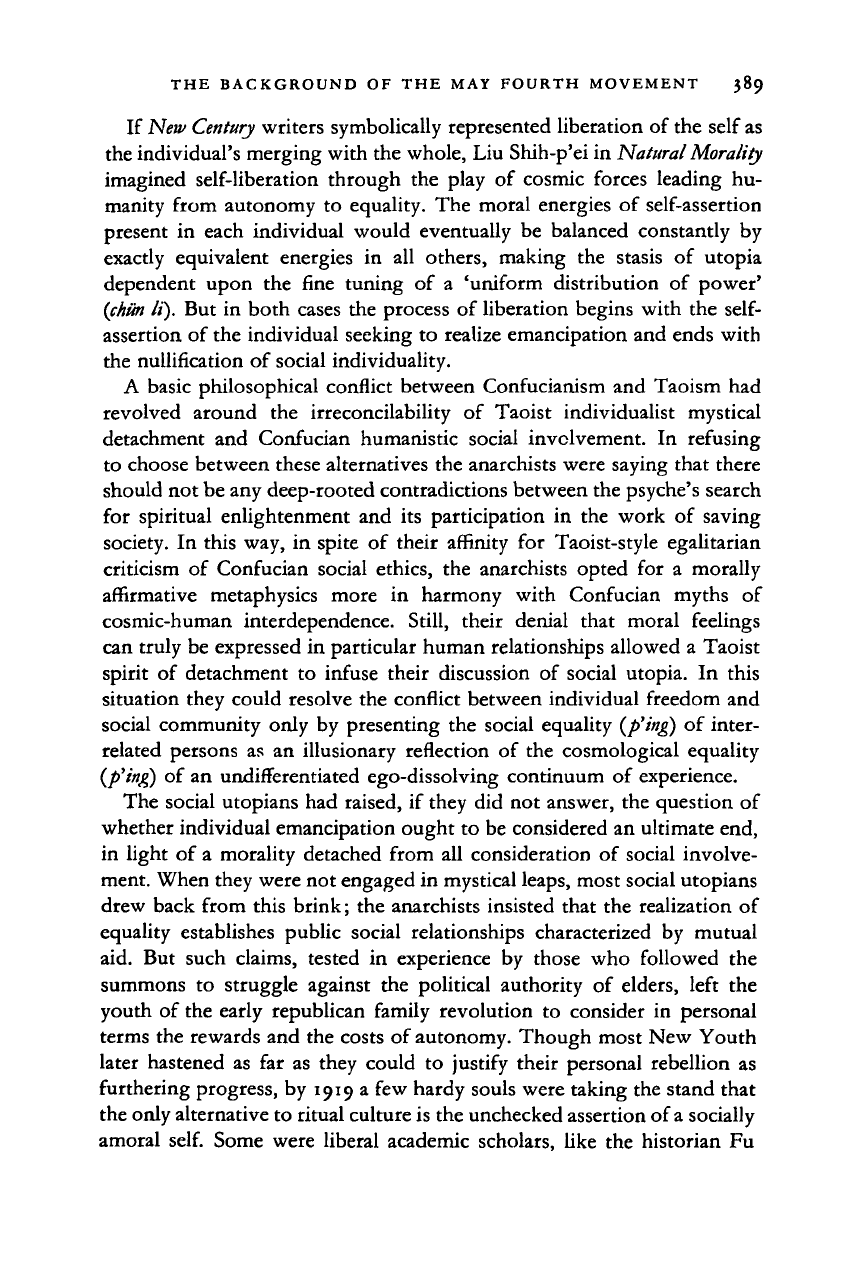
THE BACKGROUND OF THE MAY FOURTH MOVEMENT 389
If New
Century
writers symbolically represented liberation
of
the self as
the individual's merging with
the
whole,
Liu
Shih-p'ei
in
Natural
Morality
imagined self-liberation through
the
play
of
cosmic forces leading
hu-
manity from autonomy
to
equality.
The
moral energies
of
self-assertion
present
in
each individual would eventually
be
balanced constantly
by
exactly equivalent energies
in all
others, making
the
stasis
of
Utopia
dependent upon
the
fine tuning
of a
'uniform distribution
of
power'
(chim
It).
But
in
both cases
the
process
of
liberation begins with
the self-
assertion
of the
individual seeking
to
realize emancipation
and
ends with
the nullification
of
social individuality.
A basic philosophical conflict between Confucianism
and
Taoism
had
revolved around
the
irreconcilability
of
Taoist individualist mystical
detachment
and
Confucian humanistic social involvement.
In
refusing
to choose between these alternatives
the
anarchists were saying that there
should
not be
any deep-rooted contradictions between
the
psyche's search
for spiritual enlightenment
and
its
participation
in the
work
of
saving
society.
In
this
way,
in
spite
of
their affinity
for
Taoist-style egalitarian
criticism
of
Confucian social ethics,
the
anarchists opted
for a
morally
affirmative metaphysics more
in
harmony with Confucian myths
of
cosmic-human interdependence. Still, their denial that moral feelings
can truly
be
expressed
in
particular human relationships allowed
a
Taoist
spirit
of
detachment
to
infuse their discussion
of
social Utopia.
In
this
situation they could resolve
the
conflict between individual freedom
and
social community only
by
presenting
the
social equality (p'ing)
of
inter-
related persons
as an
illusionary reflection
of
the
cosmological equality
(p'ing)
of
an
undifferentiated ego-dissolving continuum
of
experience.
The social Utopians
had
raised,
if
they
did not
answer,
the
question
of
whether individual emancipation ought
to be
considered
an
ultimate
end,
in light
of
a
morality detached from
all
consideration
of
social involve-
ment. When they were
not
engaged
in
mystical leaps, most social Utopians
drew back from this brink;
the
anarchists insisted that
the
realization
of
equality establishes public social relationships characterized
by
mutual
aid.
But
such claims, tested
in
experience
by
those
who
followed
the
summons
to
struggle against
the
political authority
of
elders, left
the
youth
of
the
early republican family revolution
to
consider
in
personal
terms
the
rewards
and the
costs
of
autonomy. Though most
New
Youth
later hastened
as far as
they could
to
justify their personal rebellion
as
furthering progress,
by
1919
a few
hardy souls were taking
the
stand that
the only alternative
to
ritual culture
is the
unchecked assertion of a socially
amoral
self.
Some were liberal academic scholars, like
the
historian
Fu
Cambridge Histories Online © Cambridge University Press, 2008
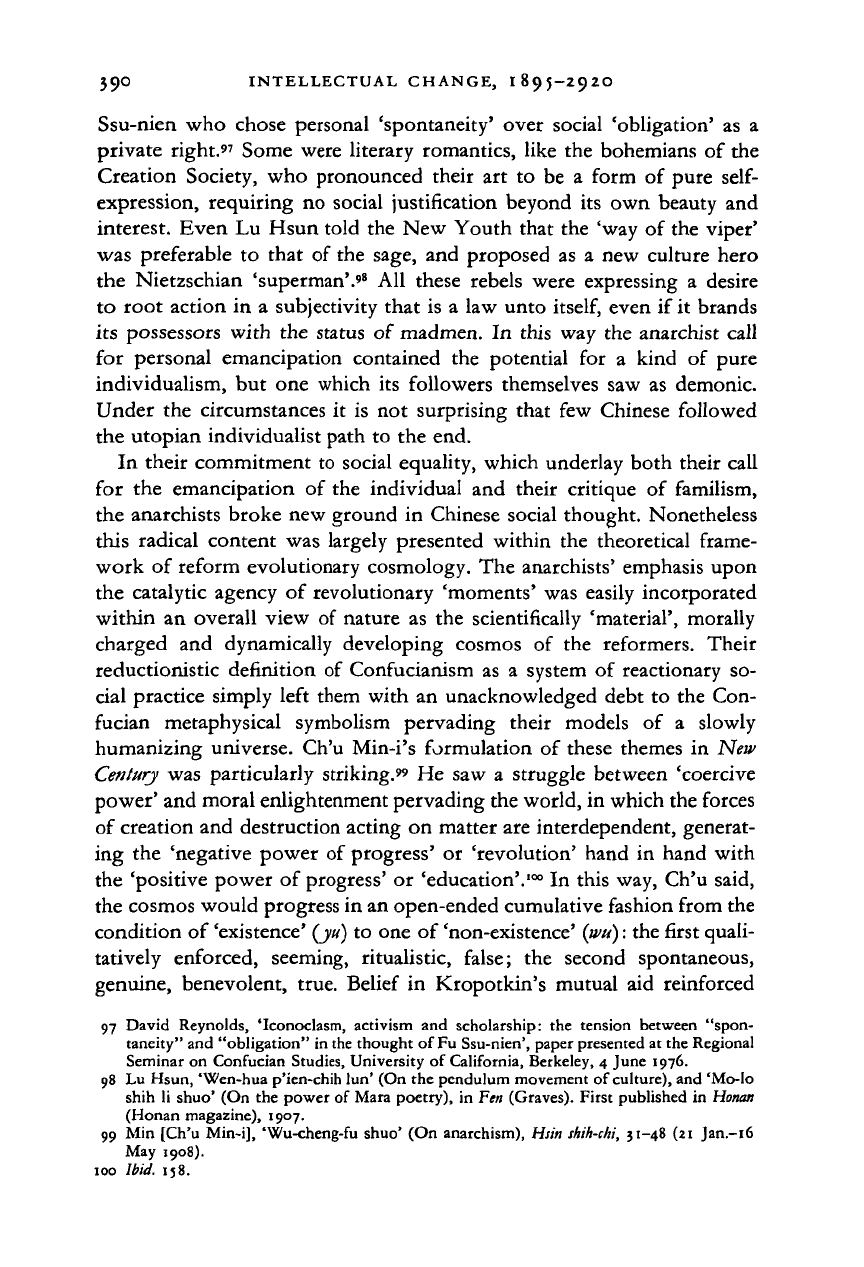
390 INTELLECTUAL CHANGE, 1895-292O
Ssu-nien
who
chose personal 'spontaneity' over social 'obligation'
as
a
private right.
97
Some were literary romantics, like
the
bohemians
of the
Creation Society,
who
pronounced their
art
to
be
a
form
of
pure
self-
expression, requiring
no
social justification beyond
its own
beauty
and
interest. Even
Lu
Hsun told
the New
Youth that
the 'way of the
viper'
was preferable
to
that
of the
sage,
and
proposed
as
a
new
culture hero
the Nietzschian 'superman'.'
8
All
these rebels were expressing
a
desire
to root action
in
a
subjectivity that
is
a
law
unto
itself,
even
if it
brands
its possessors with
the
status
of
madmen.
In
this
way the
anarchist call
for personal emancipation contained
the
potential
for a
kind
of
pure
individualism,
but one
which
its
followers themselves
saw as
demonic.
Under
the
circumstances
it
is not
surprising that
few
Chinese followed
the Utopian individualist path
to the end.
In their commitment
to
social equality, which underlay both their call
for
the
emancipation
of
the
individual
and
their critique
of
familism,
the anarchists broke
new
ground
in
Chinese social thought. Nonetheless
this radical content
was
largely presented within
the
theoretical frame-
work
of
reform evolutionary cosmology.
The
anarchists' emphasis upon
the catalytic agency
of
revolutionary 'moments'
was
easily incorporated
within
an
overall view
of
nature
as the
scientifically 'material', morally
charged
and
dynamically developing cosmos
of
the
reformers. Their
reductionistic definition
of
Confucianism
as
a
system
of
reactionary
so-
cial practice simply left them with
an
unacknowledged debt
to the Con-
fucian metaphysical symbolism pervading their models
of a
slowly
humanizing universe.
Ch'u
Min-i's formulation
of
these themes
in
New
Century
was
particularly striking."
He saw
a
struggle between 'coercive
power'
and
moral enlightenment pervading
the
world,
in
which
the
forces
of creation
and
destruction acting
on
matter
are
interdependent, generat-
ing
the
'negative power
of
progress'
or
'revolution' hand
in
hand with
the 'positive power
of
progress'
or
'education'.
100
In
this
way, Ch'u
said,
the cosmos would progress
in an
open-ended cumulative fashion from
the
condition
of
'existence'
(ju) to one of
'non-existence' (wu):
the
first quali-
tatively enforced, seeming, ritualistic, false;
the
second spontaneous,
genuine, benevolent, true. Belief
in
Kropotkin's mutual
aid
reinforced
97 David Reynolds, 'Iconoclasm, activism
and
scholarship:
the
tension between "spon-
taneity"
and
"obligation"
in the
thought
of Fu
Ssu-nien', paper presented
at the
Regional
Seminar
on
Confucian Studies, University
of
California, Berkeley,
4
June
1976.
98
Lu
Hsun, *Wen-hua p'ien-chih lun*
(On the
pendulum movement
of
culture),
and
'Mo-lo
shih
li
shuo'
(On the
power
of
Mara poetry),
in Fen
(Graves). First published
in
Honan
(Honan magazine),
1907.
99
Min [Ch'u
Min-i],
'Wu-cheng-fu shuo'
(On
anarchism), thin
shih-chi,
31-48 (21
Jan.-i6
May 1908).
100
Ibid. 158.
Cambridge Histories Online © Cambridge University Press, 2008
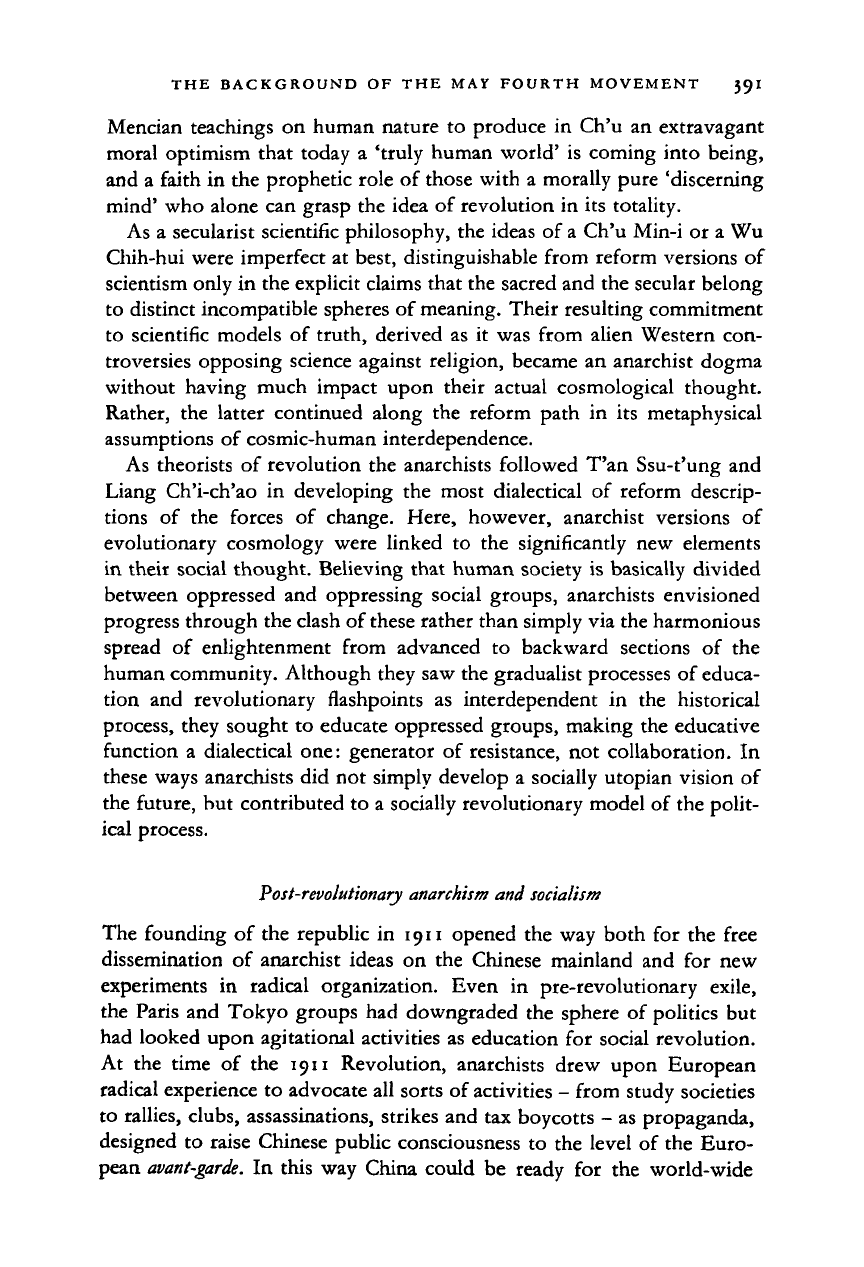
THE BACKGROUND OF THE MAY FOURTH MOVEMENT 391
Mencian teachings on human nature
to
produce
in
Ch'u an extravagant
moral optimism that today
a
'truly human world'
is
coming into being,
and
a
faith in the prophetic role of those with
a
morally pure 'discerning
mind' who alone can grasp the idea of revolution in its totality.
As
a
secularist scientific philosophy, the ideas of a Ch'u Min-i or a Wu
Chih-hui were imperfect at best, distinguishable from reform versions of
scientism only in the explicit claims that the sacred and the secular belong
to distinct incompatible spheres of meaning. Their resulting commitment
to scientific models
of
truth, derived as
it
was from alien Western con-
troversies opposing science against religion, became an anarchist dogma
without having much impact upon their actual cosmological thought.
Rather, the latter continued along
the
reform path
in its
metaphysical
assumptions
of
cosmic-human interdependence.
As theorists
of
revolution the anarchists followed T'an Ssu-t'ung and
Liang Ch'i-ch'ao
in
developing
the
most dialectical
of
reform descrip-
tions
of the
forces
of
change. Here, however, anarchist versions
of
evolutionary cosmology were linked
to the
significantly new elements
in their social thought. Believing that human society is basically divided
between oppressed and oppressing social groups, anarchists envisioned
progress through the clash of these rather than simply via the harmonious
spread
of
enlightenment from advanced
to
backward sections
of the
human community. Although they saw the gradualist processes of educa-
tion
and
revolutionary flashpoints
as
interdependent
in the
historical
process, they sought to educate oppressed groups, making the educative
function
a
dialectical one: generator
of
resistance, not collaboration.
In
these ways anarchists did not simply develop
a
socially Utopian vision of
the future, but contributed to a socially revolutionary model
of
the polit-
ical process.
Post-revolutionary anarchism
and
socialism
The founding
of
the republic
in
1911 opened the way both
for
the free
dissemination
of
anarchist ideas
on
the Chinese mainland and
for
new
experiments
in
radical organization. Even
in
pre-revolutionary exile,
the Paris and Tokyo groups had downgraded the sphere
of
politics but
had looked upon agitational activities as education for social revolution.
At
the
time
of
the 1911 Revolution, anarchists drew upon European
radical experience to advocate all sorts of activities
-
from study societies
to rallies, clubs, assassinations, strikes and tax boycotts
-
as propaganda,
designed
to
raise Chinese public consciousness
to
the level
of
the Euro-
pean
avant-garde.
In
this way China could
be
ready
for the
world-wide
Cambridge Histories Online © Cambridge University Press, 2008
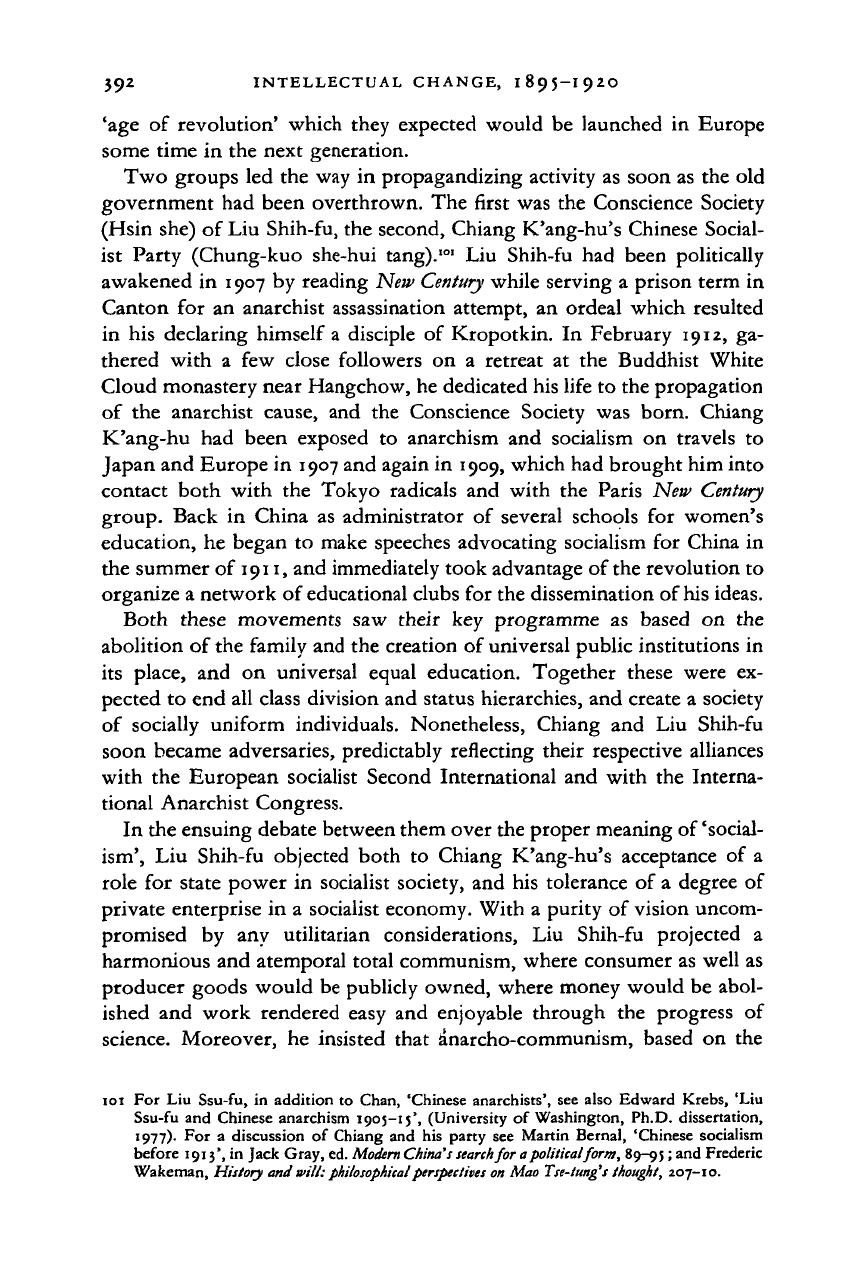
392 INTELLECTUAL CHANGE, 1895-1920
'age
of
revolution' which they expected would
be
launched
in
Europe
some time in the next generation.
Two groups led the way in propagandizing activity as soon as the old
government had been overthrown. The first was the Conscience Society
(Hsin she) of Liu Shih-fu, the second, Chiang K'ang-hu's Chinese Social-
ist Party (Chung-kuo she-hui tang).
1
"
1
Liu
Shih-fu had been politically
awakened in 1907 by reading New
Century
while serving
a
prison term in
Canton
for an
anarchist assassination attempt,
an
ordeal which resulted
in his declaring himself a disciple
of
Kropotkin.
In
February 1912, ga-
thered with
a few
close followers
on a
retreat
at
the Buddhist White
Cloud monastery near Hangchow, he dedicated his life to the propagation
of the anarchist cause, and
the
Conscience Society was born. Chiang
K'ang-hu
had
been exposed
to
anarchism and socialism
on
travels
to
Japan and Europe in 1907 and again in 1909, which had brought him into
contact both with the Tokyo radicals and with the Paris New
Century
group. Back
in
China as administrator
of
several schools
for
women's
education, he began
to
make speeches advocating socialism for China in
the summer of
1911,
and immediately took advantage of the revolution to
organize a network of educational clubs for the dissemination of his ideas.
Both these movements saw their
key
programme
as
based
on the
abolition of the family and the creation of universal public institutions in
its place,
and on
universal equal education. Together these were
ex-
pected to end all class division and status hierarchies, and create a society
of socially uniform individuals. Nonetheless, Chiang
and Liu
Shih-fu
soon became adversaries, predictably reflecting their respective alliances
with the European socialist Second International and with the Interna-
tional Anarchist Congress.
In the ensuing debate between them over the proper meaning of 'social-
ism',
Liu
Shih-fu objected both
to
Chiang K'ang-hu's acceptance
of a
role
for
state power
in
socialist society, and his tolerance of a degree of
private enterprise in
a
socialist economy. With
a
purity of vision uncom-
promised
by any
utilitarian considerations,
Liu
Shih-fu projected
a
harmonious and atemporal total communism, where consumer as well as
producer goods would be publicly owned, where money would be abol-
ished and work rendered easy and enjoyable through
the
progress
of
science. Moreover,
he
insisted that anarcho-communism, based
on the
101 For Liu Ssu-fu,
in
addition
to
Chan, 'Chinese anarchists', see also Edward Krebs, 'Liu
Ssu-fu and Chinese anarchism 1905-15', (University
of
Washington, Ph.D. dissertation,
1977).
For
a
discussion
of
Chiang and his party see Martin Bernal, 'Chinese socialism
before 1913', in Jack Gray, ed.
Modern China's
search for a political
form,
89-95; and Frederic
Wakeman, History and
will:
philosophical
perspectives on
Mao
Tse-tung's
thought,
207-10.
Cambridge Histories Online © Cambridge University Press, 2008
